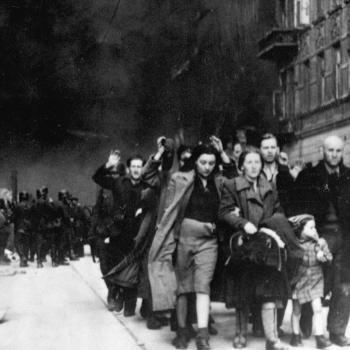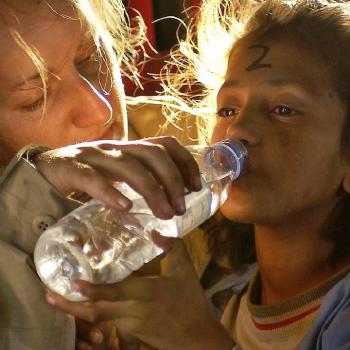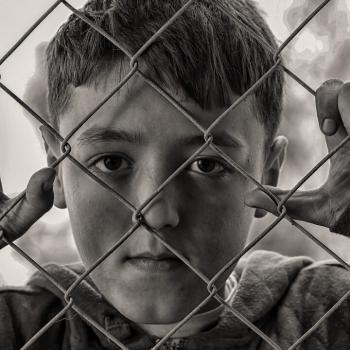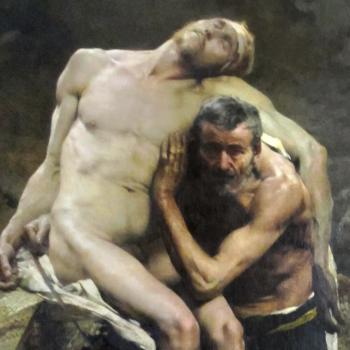
Image via Pixabay
But Alt! Is social justice really a duty of the State? Come now. Doesn’t Ratzinger say that this is for the private sector and personal action instead? It’s not a political thing, you know. He says this in Christianity and the Crisis of Cultures. He wrote it just before becoming Pope Benedict XVI. Remember? It’s in the first chapter; you leftist Catholic bloggers and writers don’t even need to read all that far.”
Okay, then. Let’s check. Here’s Ratzinger:
It is indeed true that a new moralism exists today. Its key words are justice, peace, and the conservation of creation, and these are words that recall essential moral values, of which we genuinely stand in need. But this moralism remains vague and almost inevitably remains confined to the sphere of party politics, where it is primarily a claim addressed to others, rather than a personal duty in our own daily life. (27-28)
Yes. I agree with this.
I do wish, though, that when people come across quotations like this one, they would try to put them in context. Don’t submit the pope to a proof text. Is that very much to ask? I mean, the Church talks about the state’s duty to ensure “justice, peace, and the conservation of creation” All. The. Time. How does one miss this? Christianity and the Crisis of Cultures is not a critique of social justice; it is not a critique of the welfare state. It is not a critique of liberal politics or “leftist” bloggers. It is not a primer on conservatism, or libertarianism, or the ravings of Ayn Rand. It is not the GOP platform. Instead it is a critique of Enlightenment rationalism. I know this is not the kind of thing readily reduced to a meme. It is full of sentences that do not lend themselves to cherry-picking.
Ratzinger begins his book by noting that, “During the past century, the possibilities available to man for dominion over matter have grown in a manner we may truly call unimaginable.”
This means that man enters the world, no longer as a gift of the Creator, but as the product of our own activity—and a product that can be selected according to requirements that we ourselves stipulate. [Because we have so much power, we think we are the masters.] In this way, the splendor of the fact that he is the image of God—the source of his dignity and his inviolability—no longer shines upon this man; his only splendor is the power of human capabilities. Man is nothing more now than the image of man. (26)
Let us unpack this. Man has dignity because he is the image of God; but being a creature, not the Creator, he is subject to moral boundaries. These come from God. But in modern times, the one question we ask is: Can we do this? Not: Should we do this? If we find we can clone a person, we will clone a person. In this way we become not the image of God but the image of ourselves, of our own power. But without moral limits, “the power man has will be transformed more and more into a power of destruction” (27). This concerns Ratzinger; this is the basis of his critique.
Having begun his book on that note, he then writes the words about the “new moralism” I quoted above. He says that “justice, peace, and the conservation of creation” are indeed “essential moral values, of which we genuinely stand in need.” The problem is when we do not define these values, when we keep them “vague” and “confine” them to “the sphere of party politics.”
Now that is a nuance we must not miss. These really are moral values—justice, peace, the conservation of creation. Ratzinger does not dispute their morality; he likes them. He approves of them. (And the Church tells us to pursue them, too.) What Ratzinger does dispute is that they are political values. He disputes that we can reduce to “party politics.” He disputes they have their origin there.
And I agree. This needs said. Preach it. Amen Amen dico tibi. Justice is justice because it honors the Creator by doing well for his Image. It is not justice when it is a tactic for political advantage, or an elevation of man above the Creator, as though the end of man were man.
The second problem Ratzinger has is when social justice “becomes primarily a claim addressed to others, rather than a personal duty in our own daily life.” (That is my own emphasis.)
Now, Ratzinger is correct here, too. We can’t just be telling others what they must do if we do not fulfill those same demands in our own lives. We can’t say, “Well, the State will take care of the poor, I don’t need to give to St. Vincent.” Amen Amen dico tibi; I am happy to agree with Ratzinger on this.
But in context, you will have a hard time of it if you want to use these words to claim that Ratzinger means we must confine social justice entirely to the private sphere. Not at all; he is making a different point. He says we have lost God and are trying to replace Him with utopian schemes dressed up as justice. But true social justice is not a utopian scheme.
T.S. Eliot once wrote of those who “dream of systems so perfect that no one will need to be good.” That’s what Ratzinger is getting at. The quest for Utopia becomes more important than “the dignity of the individual” (28) and ends up supplanting it. What begins as a hunger for justice results in injustice. The reason for this is because the utopian dreamers never properly define “justice.” Nor do they acknowledge God as the source of man’s rights and dignity. We yearn for genuine moral values; but if we do not acknowledge their source, if we do not say that man is inviolable because he is made in the image of God, then we achieve the opposite of what we say we want. We are not pursuing justice but utopia and power—the glory of man rather than the glory of God.
***
But must we conclude that Ratzinger thinks the State has no duty to seek social justice?
The short answer is: No. By no means. In fact, no one who makes an honest study of his words as Pope Benedict XVI could possibly conclude that. An honest study of his words would make any self-respecting libertarian’s head explode.
Let’s look.
Here are some passages from Deus Caritas Est:
26. It is true that the pursuit of justice must be a fundamental norm of the State and that the aim of a just social order is to guarantee to each person, according to the principle of subsidiarity, his share of the community’s goods. This has always been emphasized by Christian teaching on the State and by the Church’s social doctrine.
Indeed so. This goes back in the social doctrine at least to Leo XIII; and we will see anon that Benedict cites St. Augustine on the duty of the state to pursue justice.
28. The just ordering of society and the State is a central responsibility of politics. As Augustine once said, a State which is not governed according to justice would be just a bunch of thieves.
St. Augustine. Told you so. But he was probably a Communist. He was probably a leftist theologian.
28. Justice is both the aim and the intrinsic criterion of all politics. Politics is more than a mere mechanism for defining the rules of public life: its origin and its goal are found in justice, which by its very nature has to do with ethics.
Its origin and its goal is justice. It is not some cumbersome accretion.
28. Building a social and civil order, wherein each person receives what is his or her due, is an essential task which every generation must take up anew. As a political task, this cannot be the Church’s immediate responsibility. Yet, since it is also a most important human responsibility, the Church is duty-bound to offer, through the purification of reason and through ethical formation, her own specific contribution towards understanding the requirements of justice and achieving them politically.
28. A just society must be the achievement of politics, not of the Church.
Wait, did he just say that?
I’m afraid he did. Deus Caritas Est 28; look it up.
29. The direct duty to work for a just ordering of society, on the other hand, is proper to the lay faithful. As citizens of the State, they are called to take part in public life in a personal capacity. So they cannot relinquish their participation “in the many different economic, social, legislative, administrative and cultural areas, which are intended to promote organically and institutionally the common good.” The mission of the lay faithful is therefore to configure social life correctly.
So here’s where that part about “personal duty in our own daily lives” comes in. But let us interpret rightly. It is from the Church that we learn what the demands of justice are. These come from God and it is the duty of the Church to make them known. And it is the duty of all Catholics to promote justice. It is their “mission.”
But it is not just a matter of private charity. Note how Benedict XVI continues in Deus Caritas Est 30:
The Second Vatican Council rightly observed that “among the signs of our times, one particularly worthy of note is a growing, inescapable sense of solidarity between all peoples.” State agencies and humanitarian associations work to promote this, the former mainly through subsidies or tax relief, the latter by making available considerable resources. The solidarity shown by civil society thus significantly surpasses that shown by individuals.
The state has the resources to do more. Now, private charity and private action are a duty. Of course; and Benedict XVI goes on to discuss it. He says that it “must be independent of parties and ideologies.” And he says that no one should want a state that can give us all things. All that is true. It’s important to say this. But one must distinguish: To say it must be “independent of parties and ideologies” does not mean that it is not the responsibility of the State. The State is not the Party; the Party is not the State. We can argue about how much should be the job of the federal government and how much can be left to local and state governments. That is a fair discussion. But we must make distinctions.
***
Next I turn to Caritas in Veritate:
6. On the one hand, charity demands justice: recognition and respect for the legitimate rights of individuals and peoples. It strives to build the earthly city according to law and justice.
If the state is to pursue justice, the state must itself be just.
32. The dignity of the individual and the demands of justice require, particularly today, that economic choices do not cause disparities in wealth to increase in an excessive and morally unacceptable manner, and that we continue to prioritize the goal of access to steady employment for everyone.
Wealth disparity is a real concern for Pope Benedict; so much so, that he even calls for redistribution of wealth. Commonweal picks up on that. For the 45th World Day of Peace in 2012, his topic was “Educating Young People in Justice and Peace.” There he said:
Peace, however, is not merely a gift to be received: it is also a task to be undertaken. In order to be true peacemakers, we must educate ourselves in compassion, solidarity, working together, fraternity, in being active within the community and concerned to raise awareness about national and international issues and the importance of seeking adequate mechanisms for the redistribution of wealth, the promotion of growth, cooperation for development and conflict resolution.
“Redistribution of wealth” hardly means “private charity.” If you think that, I wouldn’t know what to say to you.
But I return to Caritas in Veritate.
35. The market is subject to the principles of so-called commutative justice, which regulates the relations of giving and receiving between parties to a transaction. But the social doctrine of the Church has unceasingly highlighted the importance of distributive justice and social justice for the market economy, not only because it belongs within a broader social and political context, but also because of the wider network of relations within which it operates. In fact, if the market is governed solely by the principle of the equivalence in value of exchanged goods, it cannot produce the social cohesion that it requires in order to function well.
37. The Church’s social doctrine has always maintained that justice must be applied to every phase of economic activity, because this is always concerned with man and his needs. Locating resources, financing, production, consumption and all the other phases in the economic cycle inevitably have moral implications. Thus every economic decision has a moral consequence.
Right. You may not divorce politics from the moral law, as if it’s a safe space of some kind. And the moral law includes social justice.
And now watch, because Benedict XVI is about to call for an international organization to ensure social justice.
67. To manage the global economy; to revive economies hit by the crisis; to avoid any deterioration of the present crisis and the greater imbalances that would result; to bring about integral and timely disarmament, food security and peace; to guarantee the protection of the environment and to regulate migration: for all this, there is urgent need of a true world political authority, as my predecessor Blessed John XXIII indicated some years ago. Such an authority would need to be regulated by law, to observe consistently the principles of subsidiarity and solidarity, to seek to establish the common good, and to make a commitment to securing authentic integral human development inspired by the values of charity in truth. Furthermore, such an authority would need to be universally recognized and to be vested with the effective power to ensure security for all, regard for justice, and respect for rights.
What a radical leftist. This is a goal of the left, right? They always want to give up our sovereignty to one world government schemes. How do we get these commie popes who focus on social sins rather than the way of salvation?
***
But I will show you more. Pope Benedict gave his message for the 43rd World Day of Peace in 2010 the title “If You Want to Promote Peace, Protect Creation.” No, that’s not just some lefty Soros-Obama-Bergoglio-Smoke Of Satan thing. John Paul II said that; Paul VI said that. Benedict has their quotations in his text. You can look it up.
Some highlights:
4. Can we remain indifferent before the problems associated with such realities as climate change [He believed in that too.], desertification, the deterioration and loss of productivity in vast agricultural areas, the pollution of rivers and aquifers, the loss of biodiversity, the increase of natural catastrophes and the deforestation of equatorial and tropical regions? Can we disregard the growing phenomenon of “environmental refugees”, people who are forced by the degradation of their natural habitat to forsake it – and often their possessions as well – in order to face the dangers and uncertainties of forced displacement? [He believed in our duty to refugees, too.] Can we remain impassive in the face of actual and potential conflicts involving access to natural resources? All these are issues with a profound impact on the exercise of human rights, such as the right to life, food, health and development.
Imagine that. Benedict XVI speaks of the right to life in the same breath with the right to food and the right to health. And indeed: How can one live without food and health?
8. Universal solidarity represents a benefit as well as a duty. This is a responsibility that present generations have towards those of the future, a responsibility that also concerns individual States and the international community.
9. This means that technologically advanced societies must be prepared to encourage more sober lifestyles, while reducing their energy consumption and improving its efficiency. At the same time there is a need to encourage research into, and utilization of, forms of energy with lower impact on the environment and “a world-wide redistribution of energy resources, so that countries lacking those resources can have access to them.”
And people said it was an outrage that Pope Francis would target air conditioners. Turns out Benedict shared those same concerns.
11. Education for peace must increasingly begin with far-reaching decisions on the part of individuals, families, communities and states. We are all responsible for the protection and care of the environment. This responsibility knows no boundaries.
“We are all responsible.” So yes, it is true: Justice is a “personal duty in our own daily lives.” But it is a duty of the State also, according to Benedict, who is only telling us what the Church has long told us.
***
It was not so much my intent to whelm you with quotations; though their sheer number says much. You can see: This kind of talk goes on and on and on with Benedict XVI. And to tell the truth, it goes on and on with John Paul II and Paul VI. And John XXIII. Well, go back to Leo XIII. Go back to St. Augustine! This stuff abounds, online, for free. All you need to do is read what the texts actually say. Tolle lege.
And what, in the end, of those words from Christianity and the Crisis of Cultures? My answer is: Hermeneutic of continuity. What you can’t do is say it is somehow at odds with the rest that Ratzinger said as Pope Benedict XVI. As pope he tells us that the pursuit of social justice is a primary duty of the state. He says it is a “fundamental norm of the State.” It is the “central responsibility of politics.” There is no getting rid of those words.
What he did mean, in his book, is that we can not pursue “justice” in the abstract, apart from the moral demands God makes upon us. We are responsible to him. Justice is the proper aim of the State, but the meaning of justice does not originate in the State. Nor does it originate in man. Our rights come from God; our rights belong to us because we are made in His image. That is the context of Ratzinger’s critique. Of course social justice is a responsibility of all people, in whatever sphere of life they happen to be involved in. It can not be left to the State alone. But neither can it be left to private action alone. That’s a false dichotomy. Catholics are a both-and people. We are all responsible, and our duty to social justice must also be embodied in the political order.
















